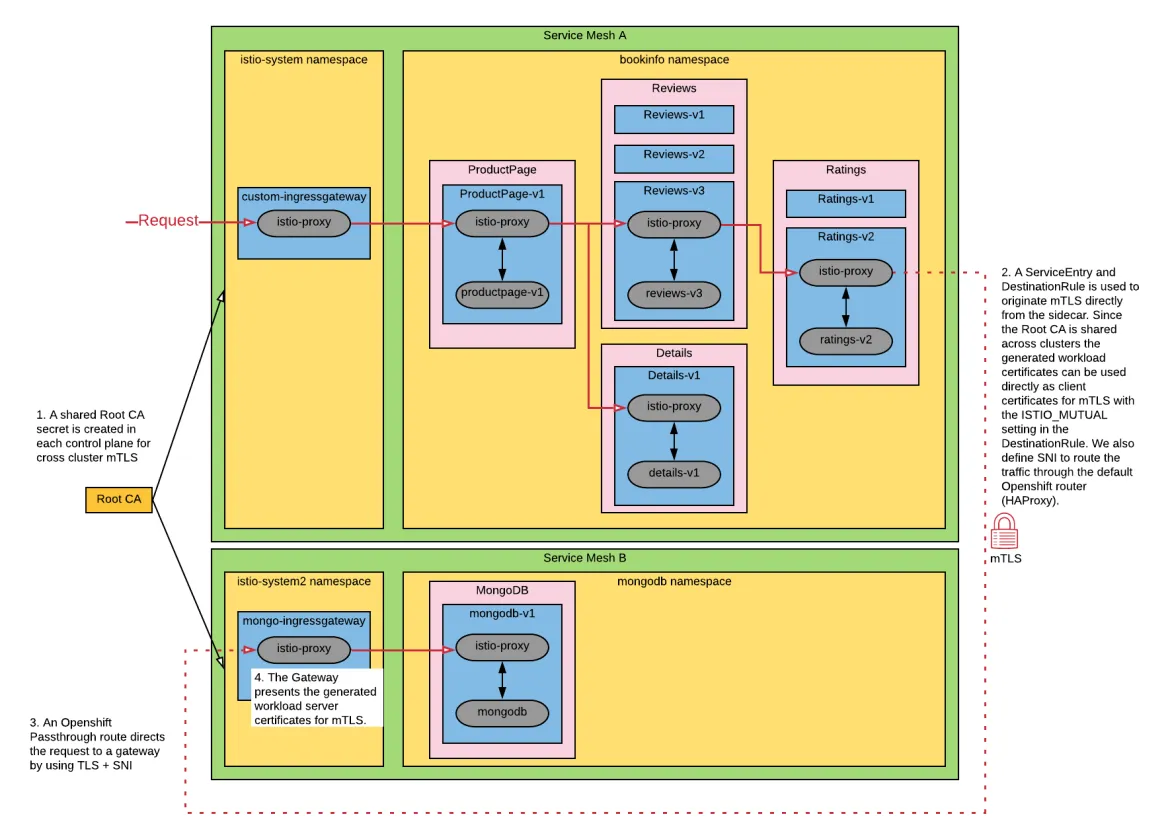Introduction
Mutual TLS (mTLS), which provides trusted communication between both a client and a server, is a primary motivation for using Red Hat Openshift Service Mesh. With a simple configuration all communication between services in a mesh can communicate with mTLS but if your organization has a requirement to implement Multicluster Service Meshes, you can still utilize mTLS for cross-cluster communication provided that both Service Mesh Control Planes (SMCPs) are configured to use the same root certificate authority (CA) when signing workload certificates. Additionally, mTLS can be performed directly from a sidecar to another control plane's ingress gateway. The result is federated trust between SMCPs.
Example
This example differs from Istio's Replicated control planes Multicluster Installation example in that we aren't configuring DNS since, as of this writing, the istiocoredns feature is not currently supported with Red Hat Openshift Service Mesh (though it is on the roadmap - see the slides on whats-new). For this reason, we need to manually create ServiceEntries because services are not auto-discovered between SMCPs without this feature.
We deploy the bookinfo application into a control plane and configure the ratings-v2 application to communicate to a mongo instance in a different control plane via an ingress gateway. A ServiceEntry and DestinationRule is used to instruct the sidecar to originate mTLS using the generated workload certificates from Citadel. The Gateway defined for the mongo ingress gateway within the other control plane is also configured to present its own generated workload certificates for mTLS.
A single OCP cluster is used to demonstrate this configuration, but since communication is performed via the exposed Openshift Route between control planes one could deploy the mongodb control plane and application in a different Openshift cluster with the same result.
Setup
This code is hosted in this GitHub repository.
#Service Mesh A
oc new-project istio-system
oc new-project bookinfo
oc new-project cert-manager
#Service Mesh B
oc new-project istio-system2
oc new-project mongodb
Deploy cert-manager (skip if already present in the cluster)
#Service Mesh A
oc apply --validate=false -f https://github.com/jetstack/cert-manager/releases/download/v0.15.0/cert-manager.yaml
Deploy local root CA to both control planes
#Service Mesh A
helm upgrade -i cert-manager -n istio-system helm/cert-manager
export tls_crt=$(oc get secret rootca -n istio-system -o jsonpath='{.data.tls\.crt}')
export tls_key=$(oc get secret rootca -n istio-system -o jsonpath='{.data.tls\.key}')
helm upgrade -i rootca helm/install-cacerts -n istio-system \
--set rootca.tls_crt=${tls_crt} \
--set rootca.tls_key=${tls_key}
#Service Mesh B
helm upgrade -i rootca helm/install-cacerts -n istio-system2 \
--set rootca.tls_crt=${tls_crt} \
--set rootca.tls_key=${tls_key}
Install control planes using common root cacerts
Note: with the below configuration defined in the SMCP, Citadel will use the cacerts secret (created in both control planes from previous commands) as the root certificate instead of its own self-signed certificate.
apiVersion: maistra.io/v1
kind: ServiceMeshControlPlane
metadata:
name: basic-install
spec:
istio:
security:
selfSigned: false
...
#Service Mesh A
helm upgrade -i istio-system-control-plane -n istio-system helm/istio-system-control-plane
#Service Mesh B
helm upgrade -i istio-system2-control-plane -n istio-system2 helm/istio-system2-control-plane
Install mongodb in istio-system2
#Service Mesh B
helm upgrade -i mongodb helm/mongodb -n mongodb --set mongodb.host=$(oc get route mongo -n istio-system2 -o jsonpath={.spec.host})
Create user and add ratings data to mongodb
#Service Mesh B
oc exec deploy/mongodb-v1 -c mongodb -n mongodb -i -t -- /bin/bash -c "cat <<EOF | mongo -u admin -p redhat --authenticationDatabase admin
use test
db.createUser(
{
user: \"bookinfo\",
pwd: \"redhat\",
roles: [ \"read\"]
}
);
db.createCollection(\"ratings\");
db.ratings.insert(
[{rating: 1},
{rating: 1}]
);
db.ratings.find({});
EOF"
Install bookinfo in istio-system
Note: Service entries for TCP traffic should have CIDR addresses defined. The bookinfo ratings v2 application will use the mongodb ServiceEntry.
#Service Mesh B
export IP_ADDRESSES=$(echo "{$(echo $(host $(oc get route mongo -n istio-system2 -o jsonpath={'.spec.host'}) | cut -d" " -f4) | sed -e "s/ /,/g")}")
# or set manually, for example IP_ADDRESSES={3.131.22.164,3.129.227.164}
export MONGODB_HOST=$(oc get route mongo -n istio-system2 -o jsonpath={.spec.host})
#Service Mesh A
helm upgrade -i bookinfo helm/bookinfo -n bookinfo \
--set mongodb.host=${MONGODB_HOST} \
--set control_plane.ingressgateway.host=$(oc get route api -n istio-system -o jsonpath={'.spec.host'}) \
--set mongodb.addresses=${IP_ADDRESSES}
Verify mTLS works between SMCP domains
Open the following url in a web browser. If you get the single ratings star it works.
#Service Mesh A
echo "https://$(oc get route api -n istio-system -o jsonpath={'.spec.host'})/productpage"
Misc
How to regenerate Istio workload certificates in a namespace
SECRETS=$(oc get secrets -n istio-system -o name | egrep 'istio\.')
for s in $SECRETS; do oc delete $s -n istio-system; done
저자 소개
Trevor Box has been a Red Hatter since 2018 and concentrates on container platforms and their adoption.
채널별 검색
오토메이션
기술, 팀, 인프라를 위한 IT 자동화 최신 동향
인공지능
고객이 어디서나 AI 워크로드를 실행할 수 있도록 지원하는 플랫폼 업데이트
오픈 하이브리드 클라우드
하이브리드 클라우드로 더욱 유연한 미래를 구축하는 방법을 알아보세요
보안
환경과 기술 전반에 걸쳐 리스크를 감소하는 방법에 대한 최신 정보
엣지 컴퓨팅
엣지에서의 운영을 단순화하는 플랫폼 업데이트
인프라
세계적으로 인정받은 기업용 Linux 플랫폼에 대한 최신 정보
애플리케이션
복잡한 애플리케이션에 대한 솔루션 더 보기
오리지널 쇼
엔터프라이즈 기술 분야의 제작자와 리더가 전하는 흥미로운 스토리
제품
- Red Hat Enterprise Linux
- Red Hat OpenShift Enterprise
- Red Hat Ansible Automation Platform
- 클라우드 서비스
- 모든 제품 보기
툴
체험, 구매 & 영업
커뮤니케이션
Red Hat 소개
Red Hat은 Linux, 클라우드, 컨테이너, 쿠버네티스 등을 포함한 글로벌 엔터프라이즈 오픈소스 솔루션 공급업체입니다. Red Hat은 코어 데이터센터에서 네트워크 엣지에 이르기까지 다양한 플랫폼과 환경에서 기업의 업무 편의성을 높여 주는 강화된 기능의 솔루션을 제공합니다.



